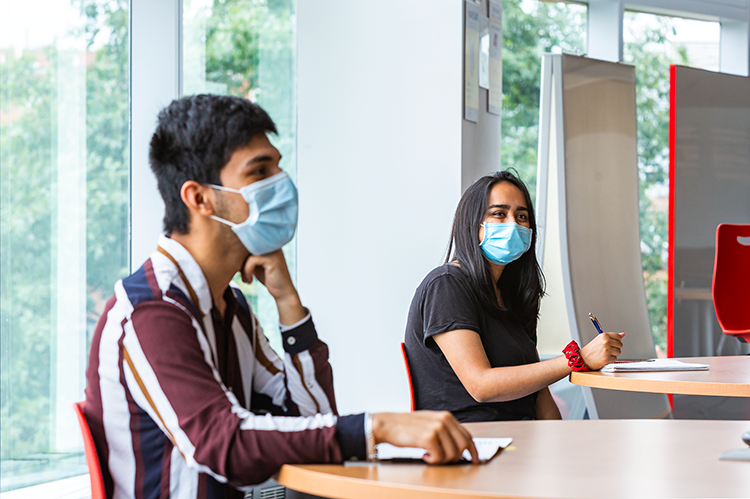
|
 |
Maryland’s EOP Framework Integration Pilot Program grant will initially focus on required courses taken by all undergraduate students in the Departments of Mechanical and Civil & Environmental Engineering. Photo: Stephanie S. Cordle |
|
The Departments of Mechanical and Civil & Environmental Engineering at the University of Maryland (UMD) have received a $30,000 grant from The Lemelson Foundation as part of the Engineering for One Planet (EOP) initiative to equip future engineers to design, build, and invent with the planet and society in mind.
One of five universities selected for the EOP Framework Integration Pilot Program grants, UMD will use the award to accelerate environmentally and socially responsible engineering through innovation in undergraduate curricula and will initially focus on required courses taken by all undergraduate students in the Departments of Mechanical and Civil & Environmental Engineering.
The Maryland team—led by Professor Elisabeth Smela, Professor David Bigio, Senior Lecturer Natasha Andrade, and Senior Lecturer Vincent Nguyen—says that together the two departments enroll 1,550 undergraduate students, allowing for substantial change with significant impact.
“As educators, our levers of change are the students we teach and help empower,” says Smela, who holds an appointment in the A. James Clark School of Engineering’s Department of Mechanical Engineering. “We know our students care about the bigger picture and want to make a difference. Now is the time to emphasize the ‘why’ of engineering and how each student can apply what they learn in the classroom as professional engineers to adapt to changing environments.”
Mobilized by The Lemelson Foundation and VentureWell with input from hundreds of stakeholders across the academic, industry, policy, and non-profit sectors, the EOP initiative is working to transform engineering education by accelerating the integration of fundamental principles of environmental and social responsibility—including systems thinking, environmental literacy, and communication and teamwork—into engineering curricula across all disciplines. Their efforts led to the development of the EOP Framework, the first implementation tool of the EOP initiative. The EOP Framework offers a distillation of competencies considered to be the core environmental and social responsibility learning outcomes that all engineering students need to understand, experience, and put into practice.
“We are excited about the University of Maryland’s inclusive approach to preparing their engineering students across multiple disciplines for technical, social, and environmental excellence,” says Cindy Cooper, program officer at The Lemelson Foundation. “Their efforts will also generate teaching resources and guidance for other institutions wishing to undertake similar changes in their engineering education.”
The Maryland team will apply the EOP Framework through curriculum innovations that include using a greater number of examples of real-world applications in courses; more opportunities for working on projects that positively impact society and the environment; de-siloing engineering by linking course learning to areas such as policy and decision making; establishing an independently managed “store” for reusing classroom and project materials from prior semesters; and encouraging students to compete in UMD’s annual Do Good Challenge and Pitch Dingman Competition, in addition to other avenues that can catalyze development of sustainable solutions.
“Our goal is to graduate Maryland engineers who possess the understanding and skills of an environmentally responsible engineer and are both empowered and energized to think and act beyond business as usual,” says Andrade, of the Clark School’s Department of Civil & Environmental Engineering. “Our curricula will focus on what engineers have done and can do moving forward to be ready for a future we cannot see.”
The Maryland team notes that research has shown that social and environmental issues are important to groups underrepresented in STEM fields, and that students who identify as members of these groups tend to leave engineering at higher rates because these issues are not addressed substantially enough in the curriculum. In an effort to address this, the faculty will work with the Black Engineers Society, the Women in Engineering Program, the Society of Hispanic Professional Engineers, and Alpha Omega Epsilon, among others, for stakeholder input throughout the EOP project at Maryland.
The process must be inclusive in order to lead to meaningful change, the team says—which is why their long-term plan includes not just implementation throughout all eight of the Clark School’s academic departments, but also engagement with a community of students and faculty from business, journalism, and other disciplines across campus; middle and high school students through the Women in Engineering Program and Engineering For US All (E4USA) initiative; and other efforts to help form wider learning communities that teach and learn through the EOP Framework.
It’s an ambitious, but realistic, goal, says the team, pointing to the Clark School’s and UMD’s existing track records of success in the areas of social impact, innovation, and entrepreneurship. To get the work started, the team acknowledges the commitments of their colleagues throughout the Clark School.
“Our four names are on the grant, but the Engineering for One Planet initiative is supported by a network of faculty and administrators throughout the Clark School,” Smela says. “It speaks volumes about the necessary shift in engineering learning and practice towards a socially aware and environmentally framed lens. We are excited that The Lemelson Foundation and VentureWell recognize the Clark School as a leader in this change.”
In addition to UMD, The Lemelson Foundation has selected Arizona State University, Oregon State University, University of Central Florida, and Villanova University as EOP Framework Integration Pilot Program grant recipients.
Related Articles:
Crank Up the AC, Not Global Warming
September 10, 2020
|